SUSTAINABILITY REPORT 2007
Tongaat Hulett strives to ensure that sustainable growth and development initiatives are integrated into all facets of its business activities. The company ensures that the economic, social and environmental aspects affecting its performance and the relationship with stakeholders in these areas is evaluated and enhanced on an ongoing basis.
This report covers the year ended December 2007 and comprises the sustainability outcomes of Tongaat Hulett’s South African, Swaziland, Mozambique and Zimbabwe operations.
Sustainable development highlights in 2007 include:
- The introduction of a 25% broad based BEE equity participation in Tongaat Hulett which includes community groupings, two BEE partners, Ayavuna Women’s Investments and Sangena Investments, and share ownership plans for South African senior black management and employees
- Inclusion in the 2007 JSE’s Social Responsibility Investment Index (SRI) for the fourth year in a row and being ranked among the 14 best performing companies on the JSE SRI Index
- Being awarded a high BEE scorecard rating as Level 3 contributor in terms of the Department of Trade and Industry scorecards
- Being awarded two FNB KwaZulu-Natal Top Business Portfolio awards in the categories of “Business and Financial Services” and “Partnership”
- A record participation of 76% South African based employees in Voluntary Counseling and Testing (VCT) for HIV
- Decrease in LTIFR (Lost Time Injury Frequency Rate) to 0,14, an improvement from 0,19 in 2006 and 0,28 in 2005
- Receiving a silver arrow award from PMR Africa recognising Tongaat Hulett as a company perceived as doing the most in its industry sector for sustainable development across South Africa
- Increase in black employee representation at top management from 25% in 2006 to 36 % in 2007
The company participates in initiatives that are relevant to the local communities within which it operates, have visible impact, and are sustainable in the future.
SAFETY

Substantial improvements continue to be achieved in safety performance at all operations, with a decrease in LTIFR from 0,19 in 2006 to 0,14 in 2007. LTIFR is the number of lost time injuries per 200 000 hours worked and includes all restricted work cases. The greatest progress was experienced in sugar where the LTIFR reduced to 0,13 in 2007 from 0,18 in 2006. In addition, R25 million was spent on new safety personnel carriers at all sugar operations. In line with the company’s objective to continually improve safety performance, a further reduction in LTIFR is targeted.
Regrettably the company experienced three fatalities in 2007. At the Maidstone Mill, a contractor undertaking an off-crop task fell from a walkway and struck his head on a concrete plinth. He was treated at the scene by paramedics and air lifted to hospital where he succumbed to his injuries. In Mozambique two fatalities occurred at Mafambisse. A supervisor of a cane cutting team and a contractor were struck and killed by a tandem trailer. These fatalities were rigorously investigated and action taken to ensure that there would not be a recurrence of these types of incidents. In accordance with standard practice the findings have been widely disseminated throughout the company to increase awareness.
It is planned to progressively improve the safety target every year with the aim of achieving an LTIFR of 0,08 by 2010. Safety statistics since 2005 and targets for 2008 (adjusted to exclude Hulamin) are contained in the table opposite:
| ACTUAL 2005 | ACTUAL 2006 | ACTUAL 2007 | TARGETS 2008 | |||||
| No. of LTI's | LTIFR | No. of LTI's | LTIFR | No. of LTI's | LTIFR | No. of LTI's | LTIFR | |
| Sugar | 89 | 0,24 | 66 | 0,18 | 62 | 0,13 | 40 | 0,11 |
| Starch | 14 | 0,90 | 6 | 0,44 | 9, | 0,66 | 5 | 0,37 |
| Developments | 4 | 4,99 | 0 | 0 | 0 | 0 | 0 | 0,00 |
| Consolidated | 107 | 0,28 | 72 | 0,19 | 71 | 0,14 | 45 | 0,12 |

All operations have programmes in place related to behaviour based safety, visible felt leadership, hazard identification and risk assessments, internal audits, management reviews and third party audits. Golden rules, standard procedures and safety training are key components of the safety improvement drive. Senior employees in operating companies are expected to ensure compliance with safety laws and remain responsible for taking steps considered to be practicable to mitigate any potential hazards.
Behaviour Based Safety
The company’s operations have adopted proactive safety culture transformation processes commonly referred to as behaviour based initiatives, which are aimed at transforming at risk behaviour to a work culture with a high level of safety responsibility and accountability. Tongaat Hulett is well advanced in the implementation of behaviour based safety programmes. The programme includes the establishment of steering committees, completion of a perception survey, site assessments and the appointment of champions, coaches and assessors. This programme is a long term process requiring support, involvement and commitment at all levels of the business.
Visible Leadership
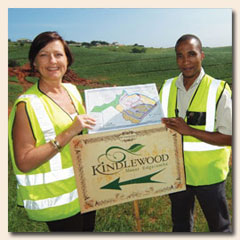
Management are encouraged to demonstrate visible leadership in safety, health and environmental issues. Senior managers inspect the scene where fatalities, lost time injuries and other safety related incidents have occurred and participate in thorough investigations and actions to prevent a recurrence. Management’s visible involvement in assessing compliance with safety, health and environment (SHE) rules, standards and procedures on the shop floor has been stepped up. Actions include internal and external SHE audits, safe behaviour reinforcement, corrective and development coaching, planned job observations, job safety analysis and critical task identification.
Risk Assessments
In accordance with the relevant risk assessment processes, high impact SHE risks have been identified and assessed on a company wide basis. The risks are rated and evaluated, with contingency plans in place to address and mitigate significant risks. The identified risks include areas such as motorised transport, fire, explosion, air emissions, noise, HIV and AIDS.
Leading Practices
Benchmarking is used to measure standards against leading best practice. Relevant information and experience is shared across all operations and Tongaat Hulett SHE committee meetings are used as one of the vehicles to promote the implementation of leading practices and shared learning. Inter-operational site visits form an integral part of the shared learning process whereby management teams have the opportunity to gain first hand information on SHE practices and access to innovative ideas. Incident learnings are also shared across the company.
HEALTH
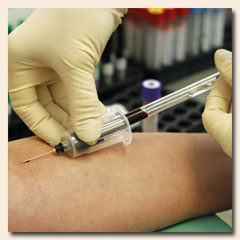
Tongaat Hulett values its employees highly, and their wellbeing is a priority. Occupational and primary health care programmes are provided at company clinics, first aid centres and at the high quality company hospital in Zimbabwe. Health care programmes include risk assessment and control measures, hygiene surveys and medical surveillance. Management in each of the operations is required to ensure that all legal requirements are complied with, and where legislation does not exist, leading practices identified and implemented.
HIV and AIDS
The enormity of the HIV and AIDS pandemic and its potential impact on the South African economy is acknowledged. The Corporate Governance Manual contains a Board approved HIV and AIDS policy, which encourages training and education, voluntary counselling and testing, and ensures the fair, compassionate and non-discriminatory treatment of those who may be affected by the disease.
Holistic and comprehensive HIV and AIDS management programmes are in place with the key elements being awareness, prevention, Voluntary Counselling and Testing (VCT), treatment that includes Anti-retroviral Treatment (ART), care and support. Due to the requirements of confidentiality and privacy, as well as medical and clinical expertise when treating HIV and AIDS patients, the company makes use of external service providers in some operations to co-manage the workplace programmes. Where appropriate, successful wellness programmes, linked to wellness days and medical surveillance, are held in various operations. The key components of these wellness programmes include healthy lifestyle education and personal health and assessment, including VCT.
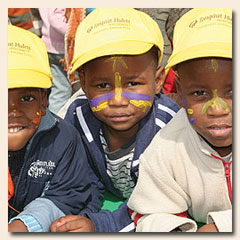
Good progress is being made with the number of employees presenting for VCT. In 2007, 76% of the employees in South Africa, 62% in Swaziland and 58% in Zimbabwe have presented for VCT. In Mozambique, progress continues to be made in respect of HIV and AIDS programmes including VCT in conjunction with the Government of Mozambique. Strategies to ensure a further increase in the number of employees participating in VCT are in place such as linking VCT to occupational medical surveillance programmes, general wellness programmes and HIV and AIDS commemorative events such as World AIDS Day. The targeted uptake in 2008 is 80% in South Africa, 60% in Mozambique, 59% in Zimbabwe and 65% in Swaziland. It is envisaged that the participation rate would be above 80% per annum throughout Tongaat Hulett by 2010.
The company’s ART programme is progressing favourably with 1 151 employees (101 in South Africa, 952 in Zimbabwe, 77 in Swaziland and 21 in Mozambique) currently receiving ART. The cost of ART, excluding the cost of other HIV and AIDS related programmes was R421 061 in 2006 and R543 229 in 2007.
Occupational Diseases
Active steps have been taken to eliminate occupational diseases with particular reference to noise induced hearing loss, occupational diseases such as asthma and dermatitis. Occupational health audits have been conducted at all operations during the past three years. Priority risks have been identified, appropriate targets set, action plans developed and programmes implemented. Further occupational health audits are planned for 2008, building on the solid platform that has been established.
Malaria

Malaria remains a significant health risk in the Mozambique, Swaziland and Zimbabwe operations. Integrated malaria control programmes to mitigate the impact of the disease are in place at the respective operating centres. The key elements of the programmes are vector control with insecticides, prevention of mosquito bites with personal protective measures and treatment of established cases of malaria. The number of malaria cases in 2007 was 1003, with 751 cases reported in Mozambique, 1 in Swaziland and 251 in Zimbabwe in 2007. In 2006, 348 cases were reported in Mozambique, 19 in Swaziland and 46 in Zimbabwe.
ENVIRONMENT
The company seeks to responsibly manage natural resources and reduce waste generation. Research is regularly undertaken to measure and monitor the impact of its operations on the environment and implement systems to ensure that resources are used in a sustainable manner.
Policies and practices are in place in South Africa, Zimbabwe, Mozambique and Swaziland to ensure operations are managed within statutory and legal parameters as well as within selfimposed targets. In Mozambique, policies are being developed in line with local standards or in advance of local standards where these are deemed inappropriate.
Major environmental risks have been identified and appropriate action is being taken to either eliminate or minimise the risks concerned. Environmental incidents and complaints are well monitored, reported and acted upon. Significant progress has been made during 2007 with the recording of environmental data on emissions, energy consumption, waste quantification and resource conservation. Specific targets have been set at each operation and are being aligned to the ISO 14001, OHSAS 18001 and NOSA requirements. Objectives and targets will facilitate meaningful progress with regard to best practice in sustainable development. The achievement of objectives and targets is monitored by external auditors, and all operations are within the permitted legal specifications. Operational targets have been set in respect of primary water use, energy use, greenhouse gas emissions, air quality (sulphur dioxide emissions), land use and bio-diversity.
Tongaat Hulett’s approach to property development is conceptualised and implemented around a sustainable development philosophy, which at its core, is aimed at achieving an appropriate balance between economic development, environmental conservation and social upliftment. Actions continue to be taken to find ways of reducing energy and water usage and to develop green lungs and indigenous carbon sinks.
The undertaking of Environmental Impact Assessments (EIA's) and implementation of the respective Environmental Management Plans (EMP's) are entrenched and all operations strive to conduct themselves in an environmentally responsible manner.
Climate Change
Tongaat Hulett’s sugar mills are fuelled, during the 8-month sugar milling season, on bagasse (sugar cane residue) and renewable fuel, resulting in the company’s operations having a small carbon footprint. Notwithstanding this, the company has implemented a number of initiatives and projects to positively manage the impact of the carbon footprint and greenhouse gas emissions from the operations. These include the conversion from the use of coal fire to natural gas, and improved plant and boiler efficiencies to reduce coal consumption. With the growing global drive to address the issue of carbon emissions and global warming on a more urgent basis, Tongaat Hulett has begun investigating a number of avenues which will positively reduce the impact of the carbon footprint, including further use of natural gas for steam generation, co-generation of electricity from natural gas in the starch operations and the expanded production of electricity from sugar cane bagasse. The company is investigating the production of bio-fuels from a number of feedstocks and at different geographic locations.
Air Quality
Since sugar mills burn bagasse as a fuel, the flue gases from the boilers do not contain harmful levels of contaminants. Wet scrubbing technology is used to remove fly-ash from the flue gas to ensure that emissions meet the required standard.
The central sugar refinery in the Durban South Industrial Basin burns coal as a boiler fuel and therefore has a greater challenge in terms of emission reduction. Relevant environmental authorities are consulted on a regular basis. Initiatives to improve operating efficiencies and minimise emissions include a procurement drive to source low-sulphur coal for reduced sulphur dioxide emissions and a R43 million complete refurbishment of the boiler plant.
Energy
The process of sugar production has a net favourable greenhouse impact. The sugar cane plant represents a fully renewable energy source since its biomass is generated in the field via uptake and conversion of carbon dioxide (CO2). Energy consumed, and therefore CO2 released, by sugar factories is obtained by burning the fibrous residue of the sugar cane plant commonly referred to as bagasse. Bagasse is burnt as a fuel in boilers to produce steam and generate electricity for the sugar mills, making them largely self-sufficient in energy terms and reducing dependence on fossil fuels. Coal is used as a primary fuel at the central refinery, which does not have a bagasse fuel source. A small amount of coal is burnt as a supplementary fuel at the sugar mills. Tongaat Hulett's sugar mills routinely generate renewable electricity for sale into the national grid. Two of the mills sell this electricity to a “green” electricity trader, for resale as certified renewable electricity to consumers. Discussions are under way with national government to facilitate a market for large-scale cogeneration of renewable electricity by the sugar industry.
At Tongaat Hulett Starch's Germiston mill, the gluten feed dryer and a boiler have been converted to operate on gas. These conversions have significantly reduced emissions from the mill. With the escalating price of coal, further investigations are underway to explore greater use of gas.
Energy usage is continuously measured and monitored and process efficiencies linked to continuous improvement targets.
Water conservation

The sugar cane plant comprises 70 percent water and sugar mills are therefore net producers of water. Water is consumed in various forms, with the largest user being the agricultural operations of Tongaat Hulett Sugar. Most of the sugar cane processed in South Africa is dryland cane, which is dependent on natural rainfall, although a proportion is irrigated. In Zimbabwe, Mozambique and Swaziland, large-scale irrigation is practised via purpose-built canal systems with water extracted from rivers. The management of these canals and irrigation systems is in keeping with the highest agronomy and safety standards. At Tongaat Hulett Starch, water usage is monitored on a daily basis and optimised to run at world standards for wet milling. Water quality is monitored on an ongoing basis at all operations.
Effluent
To minimise the quantity of liquid effluent leaving each mill or plant, a "zero effluent" philosophy has been adopted by several operations. Sugar mills recycle and re-use water within the factory, while the remaining effluent undergoes biological treatment (aerobic and anaerobic) to reduce its chemical oxygen demand to acceptable levels before discharge. Water that is produced as part of the sugar milling process is used for irrigation of sugar cane on adjacent estates.
Tongaat Hulett Starch’s effluent is treated at local authority treatment plants, with constant monitoring of effluent quality being carried out.
Waste
Some operations have re-engineered and refined services to reduce waste and increase resource productivity over the last few years. These initiatives have yielded significant savings offering new revenue streams from the sale, exchange and recycling of by-products. Specific projects in 2007 included the quantification of waste streams and the establishment of waste recycling programmes.
Food Safety
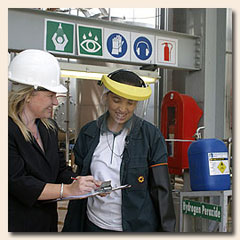
Tongaat Hulett continues to manage its maize requirements on a non-genetically modified basis using a sophisticated identity preservation system. This ensures the company’s ability to meet the needs of its customers in the food industry. In addition, ongoing attention is paid to the requirements of ISO 9001 and the Hazard Analysis Critical Control Point system (HACCP) and ISO 22 000 in terms of quality and food safety standards.
Environmental Compliance
There were no major material incidents, fines or non-monetary sanctions for non-compliance with applicable environmental regulations during the year under review. Community liaison forums have been established between Tongaat Hulett and interested parties to address environmental related complaints. In 2007, 113 complaints were received, being a considerable reduction from the 183 received in 2006.
THIRD PARTY CERTIFICATIONS
All operating companies have embarked on programmes to conduct third party audits and / or certifications. In this regard, targets have been set for third party audits and certifications associated with NOSA, OHSAS 18001, ISO 14001, ISO 9001 and HACCP/GMP. All South African operations are certified under the ISO 14001 Environmental Management Systems. All sugar operations were audited by NOSA on the integrated star rating system. All starch operations are ISO 9001 certified, and are also ISO 14001 certified with the exception of Meadowdale. Germiston is OHSAS 18001 certified. Mozambique and Zimbabwean operations have undergone initial ISO 14001 assessment and it is envisaged that they will receive certification in 2008. The Swaziland operation is certified to OHSAS 18001, ISO 14001, ISO 9001 and NOSA. Some starch and sugar operations have embarked on HACCP/ ISO 22000 assessment with the objective of getting certified in 2008.
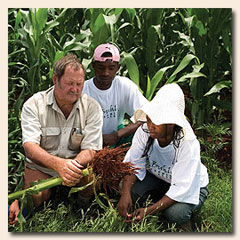
PEOPLE DEVELOPMENT
Superior performance is key to success in a challenging business environment. Programmes are in place at all operations as part of the companywide commitment to attract, develop and retain valuable skills. Performance and talent management processes establish clear roles and responsibilities, performance reviews, performance ratings, assessment of future potential and action plans to enhance performance across the company. Competency gaps and individual training and development needs are identified and action plans implemented to address these needs. These plans are linked to company workplace skills plans.
Issues that have received particular attention during 2007 include a further strengthening of performance and talent management. Action plans continue to be developed to address the needs of high performing and highly talented individuals and to deal with performance issues in cases where high standards being set are not achieved. It is planned to continue strengthening training and development practices at all levels including supervisory, management and leadership development, learnerships, in-service training, operator training and general skills development of shop floor employees. The implementation of coaching and mentoring processes is making satisfactory progress.
One of the major challenges is to recruit, develop and retain key skills in an environment of fierce competition for scarce talent. In this regard, there is a need to ensure an appropriate pipeline of skilled people to meet future skills requirements and for succession planning purposes. To support this objective, innovative recruitment strategies are being used which include the use of psychometric assessments and web based recruitment.
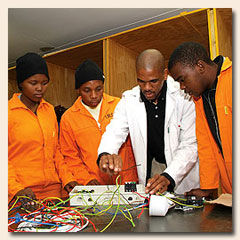
Bursaries, scholarships, trainee programmes and learnerships are sponsored by the company to assist with sourcing and developing bright young minds in anticipation of future skills requirements. To support this programme, strong partnerships have been formed with select educational institutions and Sector Education and Training Authorities (SETAs). Workplace skills plans and implementation reports are submitted to the relevant SETA on an annual basis. More than 2 056 employees participated in training programmes during 2007 and 82 employees participated in the company’s study aid scheme, which is aimed at assisting employees with part time tertiary education. The number of learners, in-service trainees and bursars has been increased to 137.
It is planned to increase the number of learnerships, in-service trainees and bursaries to ensure a steady intake of young talent into the talent pipeline to meet future needs. At the same time an appropriate racial and gender composition will be ensured.
Intellectual Property
Tongaat Hulett’s intellectual property is protected through employment contracts and confidentiality agreements with external parties. These agreements establish ownership of and rights to innovations and inventions resulting from any dealings with the company. In Tongaat Hulett Sugar a portfolio of patents is managed by a knowledge management specialist in consultation with patent attorneys. Protection of patentable ideas is achieved by taking out provisional patents immediately, with targeted national and international patenting.
BROAD BASED BLACK ECONOMIC EMPOWERMENT
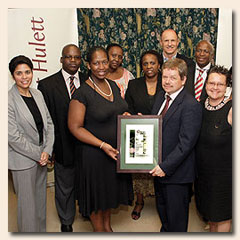
Transformation and the creation of a diverse employee profile and indigenisation remain a key performance area and the company’s track record has been outstanding. Steps are being taken to ensure that processes and measurements within the company are aligned with the relevant regulatory requirements and the Department of Trade and Industry’s Codes of Good Practice. Where applicable, operations are involved in the formulation and/or implementation of relevant industry/ sector scorecards.
In 2007 Tongaat Hulett completed a corporate restructuring transaction, which included the introduction of broad based equity participation in the company. Equity participation agreements were concluded with two BEE partners namely: -
- Ayavuna Women’s Investments, as an anchor partner, combining with the Mphakathi Trust, which benefits the communities surrounding the Tongaat Hulett property developments, and
- Sangena Investments, as an anchor partner, combining with the Masithuthukisane Trust, which benefits the small scale cane grower communities surrounding Tongaat Hulett’s four South African sugar mills.
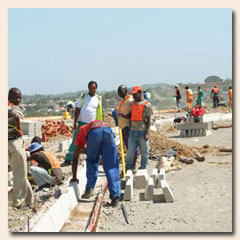
In addition, Tongaat Hulett established the ESOP/MSOP employee ownership schemes for the benefit of all South 2007 African senior black management and employees, effectively placing a collective interest of 7% in the hands of its employees. The overall objective of the schemes is to retain and attract high calibre black employees at every level of the business and to create a sense of ownership amongst the employees, as well as to engender an ownership culture within the greater Tongaat Hulett workforce.
The first broad based BEE (BBBEE) rating was also conducted in 2007 by the National Empowerment Rating Agency (NERA) with Tongaat Hulett being categorised as a Level Three Contributor obtaining an overall score of 75,16%. This means that entities purchasing from Tongaat Hulett may recognise 110% of the value of their Tongaat Hulett purchases on the procurement elements of their scorecards. The scores for the individual elements of the scorecard are below.
Now that the first BBBEE rating has been completed, there is much greater clarity on the data required, reporting formats and areas of focus. Going forward, reporting systems and targets will be reviewed to ensure maximum alignment with the respective elements of the DTI Codes of Good Practice.
| TH Score | Weighting | |
| Ownership | 21,63 | 20,00 |
| Management control | 6,99 | 10,00 |
| Employment equity | 9,16 | 15,00 |
| Skills development | 6,34 | 15,00 |
| Procurement | 12,32 | 20,00 |
| Enterprise development | 13,73 | 15,00 |
| Socio-economic development | 5,00 | 5,00 |
| Total | 75,16 | 100,00 |
One of the major opportunities flowing from the introduction of BEE equity partners stems from the use of service agreements established by the transaction to help its competitive position, particularly in the areas of cane procurement, land restitution as well as approvals for land use change and local government funding support.
Employment Equity
Tongaat Hulett values the dimensions that a diverse human resource base brings to its operations. From time to time employees are moved between countries. Employees in the Zimbabwe and Swaziland operations consist almost exclusively of local citizens, with a few exceptions. Mozambique continues to experience a skills shortage as a result of which more foreign nationals are employed in that country than might be expected. Plans are underway to employ and train local citizens to gradually replace foreign nationals in Mozambique. Innovative strategies are being used to retain people with key skills at the Zimbabwe operations where challenging circumstances prevail.
In South Africa, where there is a particular need to address the imbalances of the past, a strong employment equity culture has been fostered over many years, and actions are continuing to improve the representation of designated groups, with particular emphasis on Africans, women and persons with disabilities. Currently, 50,2% of management, and 77,5% of skilled and supervisory positions are filled by black employees. Of the 450 graduates, 58 % are black employees, with women constituting 32,9%.
Employment equity targets have been set for 2008, 2009 and 2010 and action plans will be implemented to ensure that the targets are met. These plans include targeted recruitment and placement coupled with talent and performance management, training and development, coaching and mentoring, managing cultural diversity and the elimination of racial pockets where these exist. Increasing the representation of black females, remains a challenge and concerted efforts will continue to improve performance in this area. It is anticipated that the MSOP and ESOP schemes will make a substantial contribution to the attraction and retention of key black employees in South Africa. Increased focus is being placed on the representation of persons with disabilities.
In accordance with the Employment Equity Act No. 55 of 1998, employment equity reports are submitted to the Department of Labour on an annual basis. In 2007 a consolidated report for Tongaat Hulett was submitted. In terms of section 22 of the Act, the company is required to publish a summary of its employment equity report in the Annual Report in the format of the next table. The table, which reflects the employee profile of the company’s South African operations, as at 31 May 2007, formed part of the Tongaat Hulett report submitted to the Department of Labour in 2007.
As at 31 December 2007, the proportion of black females at top management was 16,0 percent compared to 0 percent in 2006 and black females in management increased from 11,7 percent to 14,7 percent. There were 40 employees with disabilities, which constituted 0,7 percent of the employee complement.
Employment Profile as at 31 May 2007 submitted to Department of Labour
| Designated | Non-Designated | TOTAL | ||||||||||
| Occupational Levels | Male | Female | *Total | White Male |
Foreign Nationals |
|||||||
| A | C | I | A | C | I | W | A, C, I | W | Male | Female | ||
| Top management | 3 | 0 | 0 | 0 | 0 | 0 | 0 | 3 | 12 | 0 | 0 | 15 |
| Senior management | 18 | 4 | 15 | 4 | 2 | 5 | 3 | 48 | 68 | 3 | 0 | 122 |
| Professionally qualified and experienced specialists and mid-management | 52 | 6 | 46 | 21 | 3 | 19 | 27 | 147 | 83 | 3 | 3 | 263 |
| Skilled technical and academically qualified workers, junior management, supervisors, foremen, and superintendents | 309 | 59 | 245 | 98 | 17 | 51 | 76 | 779 | 160 | 2 | 2 | 1 019 |
| Semi-skilled and discretionary decision making | 948 | 16 | 210 | 111 | 3 | 25 | 13 | 1 308 | 6 | 0 | 1 | 1 328 |
| Unskilled and defined decision making | 1 339 | 0 | 30 | 627 | 0 | 7 | 0 | 2 003 | 1 | 0 | 0 | 2 004 |
| TOTAL PERMANENT | 2 664 | 85 | 546 | 861 | 25 | 107 | 119 | 4 288 | 330 | 8 | 6 | 4 751 |
| Non-permanent employees | 142 | 3 | 2 | 40 | 1 | 2 | 3 | 190 | 3 | 0 | 0 | 196 |
| GRAND TOTAL | 2 806 | 88 | 548 | 901 | 26 | 109 | 122 | 4 478 | 333 | 8 | 6 | 4 947 |
| Note: A=African C= Coloured I= Indian W=White | *The column headed Total A, C, I has been added for clarity | |||||||||||
The overall proportion of blacks in management as at 31 December 2007 was 50,2 percent of permanent staff at this level, compared to 48,0 percent in the previous year (adjusted to exclude Hulamin). The following table reflects a year on year comparison of black employee representation in proportion to permanent staff at various levels as at 31 December 2007.
| 2006 | 2007 | |
| Top management | 25% | 36% |
| Senior management | 40% | 42% |
| Middle management | 53% | 55% |
| Skilled and supervisory | 76% | 77% |
Labour Relations
The company has always maintained a constructive relationship with unions, and a general climate of industrial peace has prevailed over the past few years. There are recognition agreements with 13 different unions and approximately 65 percent of permanent employees are members of unions. Senior management are involved in union negotiations with senior human resources staff playing a key role in this regard.
Disciplinary codes and procedures have been implemented after negotiations with unions concerned. Four minor work stoppages of short duration involving a small number of employees with minimal cost impact occurred during the year.
Preferential Procurement
The objective of Preferential Procurement under the newly released DTI’s Codes of Good Practice includes the promotion of BEE compliance by all entities, targets for procurement from Exempted Micro Enterprises (EMEs) and Qualified Small Enterprises (QSEs), black-owned and black women owned enterprises. Furthermore, with enhanced recognition for Procurement from value adding suppliers and enterprise development beneficiaries the procurement of locally produced goods and services would assist in income streams to new entities ensuring sustainability.
In respect of the Procurement Scorecard for Tongaat Hulett recently released, based on the 2006 expenditure, out of a total available spend which is defined as total procurement spend less spend on parastatals and importation of goods not locally produced of R 3,938 billion, BEE procurement spend from all suppliers based on the BEE procurement recognition levels as a percentage of total measured spend was R 1,375 billion (34,9%).
Spend with companies which are more than 50% black owned totalled R 185 million whilst spend with QSEs or EMEs totalled R 0,867 million.
Enterprise Development
Tongaat Hulett has a track record of building major businesses. Enterprise development has occurred, for example, through the sale of businesses to new black shareholders. Major successful BEE transactions concluded by the company included the sale of Supervision Food Services and Corobrik Klerksdorp Brick Factory.
The Starch operation is involved in the development of commercial black farmers in partnership with the Buhle Farmers Academy. A fully equipped maize farm with accommodation was established on the site of the Kliprivier plant during 2007. 11 black student farmers, including 3 women, who had already completed the crop growing course at the Academy were given the opportunity to move to the farm and grow maize in a real life situation for a period of one year. A new intake of students will be hosted each year with the intention of improving their eventual success as commercial farmers. The Starch operation intends to procure the maize crop from the students at commercial rates for use in their manufacturing process. A mentorship programme for small black owned businesses with previously disadvantaged maize transporters are being trained to acquire relevant skills in running small enterprises. Three of the six participating businesses have been successful in winning contracts via tender processes and in increasing the size of their fleet of trucks during the year. Of the three remaining businesses, two have folded due to longstanding financial issues and one continues to maintain its business by providing transport at the Kliprivier Silo Bags site. The participants have acknowledged the value of the programme and have reached a stage where they require less involvement from the mentors. The operation continues to donate Gluten 20 and Maltose Dextrin to the Cluny Home for mentally disabled residents. The product is used in a feeding programme to improve the output of the dairy herd at the facility. The profits from the sale of dairy produce assists in supporting the costs of the facility.
The Property Development operation has partnered with the eThekwini/Durban Municipality in public private partnerships such as the approval of Umhlanga Ridgeside project, which is expected to unlock significant opportunities through the development of 140 hectares, the Ushaka Marine World and the Durban Point Waterfront development. These joint initiatives continue, with the expansion of RiverHorse Valley Business Estate and the Bridge City commercial development.
Tongaat Hulett has sold some 11 871 hectares to 98 BEE medium scale farmers since the commencement of its programme in 1995 to transfer sugar cane farming skills and farms to previously disadvantaged emergent farmers. This land redistribution programme forms a major component of the company’s Black Economic Empowerment Programme and is supported by the Department of Agriculture, the Department of Land Affairs and the Sugar Industry. The sale of farms to medium scale farmers equates to about 50 percent of the company’s land holdings in South Africa, compared to the government’s target of 30 percent for transfer to black farmers by 2015.
In addition to the mentoring and support services provided to emergent farmers, Tongaat Hulett Sugar plays a leading role in the land reform initiative (Inkezo) of the South African Sugar Industry. In the Zimbabwe and Mozambique operations various cane procurement initiatives from small and medium scale growers are undertaken.
CORPORATE SOCIAL INVESTMENT
Tongaat Hulett has a well-entrenched Corporate Social Investment (CSI) policy with guiding principles on key focus areas for social resposibility activities. The company continues to promote sustainable development through constructive CSI initiatives, which are aimed at building and enhancing the quality of life of people, with emphasis on previously disadvantaged communities within which Tongaat Hulett operates.
CSI spend is mainly directed at education, health, community skills upliftment, charitable organizations, environmental needs and crime prevention. The primary focus of CSI spend in 2007 was education with a total spend of R3,95 million in this category. Key education projects included an amount of R1,7 million used to donate lap desks to schools mainly in the rural areas and R370 000 allocated for the development of a science laboratory and media centre in South Africa. Hippo Valley Estates in Zimbabwe spent R500 000 towards the running costs of nine primary schools and one secondary school as part of its CSI initiatives. The operation believes that schools can provide a healthy environment for students and staff, while promoting ecological sustainability by changing their resource consumption patterns and teaching students to be stewards of their communities and its resources.
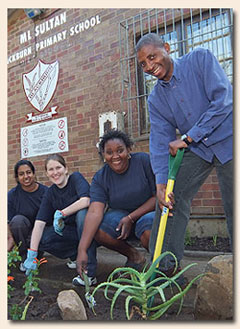
Other notable contributions in 2007 included a contribution of R500 000 to Business Against Crime and a further R201 000 to the National Business Initiative. Community Development programmes received R1,28 million in sponsorship, while R2,18 million was spent on Health, Welfare and Community Training programmes. All operations have Occupational Health Clinics that provide occupational and primary health care services at company expense and during 2007 the company spent R4,9 million on these facilities.
In addition to the donation of funds to worthy projects, expertise is made available by company management to guide community project leaders. Where appropriate, CSI initiatives will be linked with business objectives through a corporate social partnership approach, to ensure that the company’s involvement is in line with community priorities, for example in the case of partnership activities at the property developments operation.
The total CSI spend for the year ended 31 December 2007 including the cost of company sponsored occupational and primary health care services was R15,7 million which was above the company’s commitment to allocate at least one percent of headline earnings to CSI on a companywide basis annually.
VALUE ADDED ANALYSIS
for the year ended 31 December 2007
| Rmillion | ||
| 2007 | 2006 | |
| Restated | ||
| REVENUE | 6 395 | 5 110 |
| Bought-in materials and services | (4 670) | (3 553) |
| VALUE ADDED BY OPERATIONS | 1 725 | 1 557 |
| Dividends and other income | 337 | 320 |
| Exceptional items | 48 | 26 |
| TOTAL VALUE ADDED | 2 110 | 1 903 |
| Applied as follows: | ||
| TO PAY EMPLOYEES | ||
| Salaries, wages and benefits | 929 | 786 |
| TO PAY PROVIDERS OF CAPITAL | 1 194 | 544 |
| Interest on borrowings | 193 | 38 |
| Distributions to shareholders | 1 001 | 506 |
| TAX | 288 | 238 |
| (UTILISED)/RE-INVESTED IN BUSINESS | (301) | 335 |
| Depreciation | 222 | 186 |
| Retained earnings after distribution to shareholders | (523) | 149 |
| 2 110 | 1 903 | |
The results of Hulamin for 2007, the fair value adjustment of the investment in Hulamin and the BEE IFRS 2 charge and transaction costs have been excluded from this schedule. The 2006 comparative figures have been restated to exclude the results of Hulamin.
STAKEHOLDER ENGAGEMENT
In conducting its business Tongaat Hulett continually strives to ensure accountability to and recognition of its diverse stakeholder base through structured and constructive engagement. Stakeholder processes in 2007 identified and included the following key stakeholders and engagements:
- Shareholders, investors, analysts and media – well entrenched investor relations activities exist within the company which focus on continuously communicating with all stakeholders and ensuring that corporate disclosure requirements are adhered to. Communication takes place through meetings with management, telephonic conversations, internet and e-mail. In addition, annual and interim results presentations are held in Johannesburg, Cape Town and Durban in order to explain the company’s performance and prospects. Engagement with the media takes place on a formal as well as informal basis with media briefings, press releases and SENS announcements on the website. Shareholders are encouraged to attend the Annual General Meeting.
- Customers and suppliers – each operating area has a marketing unit which meets with customers on an ongoing basis to determine specific customer needs, preferences, usage and to evaluate perceptions regarding Tongaat Hulett’s newly launched or existing products and services. Collective meetings with partners, suppliers and customers are held on an ongoing basis.
- Government authorities and regulators – company specific interaction takes place on a continuous basis on issues relating to regulatory compliance and to further optimise opportunities. During 2007, the property development operation engaged extensively with the eThekwini municipality on key matters including development approvals. The sugar and starch operations engaged with the Department of Agriculture on agri-processing and land issues. Ongoing interaction with the Department of Trade and Industry takes place regarding labour specific matters, interpretation of the new BEE scorecards and transformation issues.
- Employees – employees are kept abreast of local and corporate business developments via internal newsletters, company intranet, briefings and internal memos. The biannual results presentations are made available to staff by invitation and also through the company intranet.
- Unions – managers in all operations interact with unions on relevant employment issues with collective bargaining taking place where appropriate. The sugar and starch operations are the most labour intensive businesses and structures are in place to engage with the various unions.
- Local communities – the company engages closely with local communities to have a broader understanding of community concerns and priorities. Community related programmes include enterprise development and training, employment, learnerships, environment protection, cultural heritage and support for recreation.
FEEDBACK
Please share your views on this sustainability report with us by sending an email to info@tongaat.co.za




